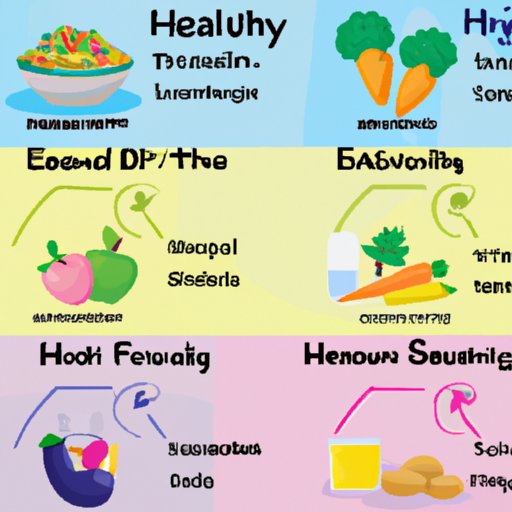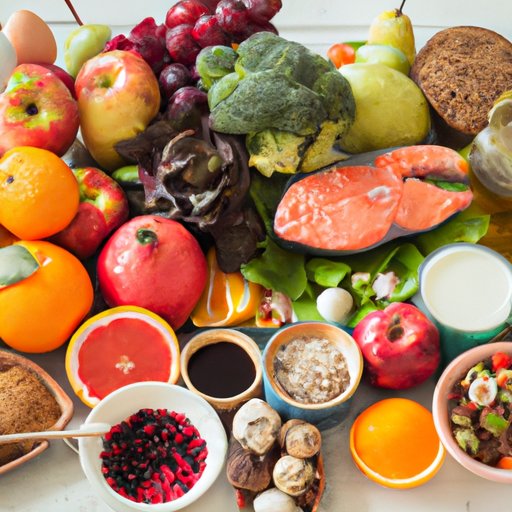Introduction
Healthy eating is an important part of maintaining a balanced lifestyle. Eating healthy foods can help you maintain a healthy weight, reduce your risk of chronic diseases, and promote overall wellbeing. Knowing what foods are good for you and how to incorporate them into your diet is key to achieving your health and fitness goals.

Nutritional Benefits of Eating Healthy Foods
When it comes to eating healthy, it’s important to understand the different types of nutrients that your body needs. These include vitamins, minerals, proteins, fats, and carbohydrates. Each of these macronutrients plays an important role in keeping your body functioning optimally, from helping to build strong bones and muscles to providing energy.
Vitamins and Minerals
Vitamins and minerals are essential for many bodily functions, such as helping to regulate hormones, building strong bones and muscles, and synthesizing DNA. Fruits and vegetables are excellent sources of vitamins and minerals, and should be included in your daily diet for optimal health.
Protein
Protein is an important macronutrient for growth and repair. It is made up of amino acids which are the building blocks of muscle. Lean meats, fish, eggs, and dairy products are all great sources of protein. Plant-based proteins such as beans, nuts, and seeds are also excellent sources of protein.
Fats
Fats are an essential part of a healthy diet. They provide energy, help with absorption of certain vitamins, and are necessary for brain development. Healthy fats such as olive oil, avocados, and nuts should be included in your diet. It’s important to limit saturated and trans fats, which are found in processed and fried foods.
Carbohydrates
Carbohydrates are the body’s main source of energy. Whole grains, fruits, and vegetables are all sources of carbohydrates. Refined carbohydrates such as white bread, white rice, and sugary snacks should be limited in your diet.

A Comprehensive List of Superfoods
Superfoods are nutrient-dense foods that are packed with vitamins, minerals, antioxidants, and other beneficial compounds. Incorporating these superfoods into your diet can help support your health and fitness goals.
Fruits
Fruits are an excellent source of vitamins, minerals, and fiber. Some of the best superfood fruits include blueberries, oranges, apples, bananas, and pomegranates. Adding a variety of fruits to your diet can help you meet your daily nutrient needs.
Vegetables
Vegetables are an essential part of any healthy diet. Leafy greens such as spinach and kale are excellent sources of vitamins and minerals. Other nutrient-dense vegetables include broccoli, carrots, sweet potatoes, peppers, and tomatoes.
Whole Grains
Whole grains are an excellent source of complex carbohydrates, fiber, and other important vitamins and minerals. Examples of whole grains include oats, quinoa, brown rice, barley, and buckwheat. Aim to include at least three servings of whole grains into your diet each day.
Healthy Fats
Healthy fats are essential for heart health, brain function, and cell growth. Olive oil, avocados, nuts and seeds, and fatty fish such as salmon are all excellent sources of healthy fats. Including a variety of healthy fats in your diet can help you meet your daily needs.
Lean Proteins
Lean proteins are an important part of any healthy diet. Examples of lean proteins include lean beef, chicken, turkey, fish, eggs, and plant-based proteins such as beans, lentils, and tofu. Aim to include at least one serving of lean protein into your meals each day.
How to Incorporate Healthy Foods Into Your Diet
Eating healthy doesn’t have to be complicated or time consuming. Here are some tips for incorporating healthy foods into your diet:
Planning Ahead
Meal planning is a great way to make sure you’re getting the right balance of nutrients in your diet. Try to plan out your meals for the week ahead so you know exactly what you need to buy and prepare. This will also help you save time during the week.
Shopping Smart
Making smart choices when grocery shopping is key to sticking to a healthy eating plan. Focus on buying fresh, unprocessed foods and read labels to make sure you’re choosing the most nutritious options. Try to buy organic whenever possible.
Making Small Changes
Small changes can make a big difference to your health. Start by making small changes to your diet such as adding more fruits and vegetables, switching to whole grains, and limiting processed and sugary foods. Over time, these small changes will add up to big results.

The Health Benefits of Eating Organic Foods
Organic foods are grown without pesticides, antibiotics, or other synthetic chemicals. Eating organic foods can provide numerous health benefits, including:
Lower Risk for Pesticide Exposure
Organic foods are grown without the use of synthetic pesticides. Eating organic foods can reduce your risk of exposure to potentially harmful chemicals.
More Nutritious
Organic foods are often more nutrient-dense than non-organic foods. Studies have shown that organic produce tends to contain higher levels of vitamins, minerals, and antioxidants than non-organic produce.
Improved Environmental Sustainability
Organic farming practices are more sustainable than conventional farming methods. By choosing organic foods, you’re helping to reduce pollution, conserve water, and protect soil quality.
Making Smart Food Choices for a Balanced Diet
Eating a balanced diet is essential for maintaining good health. Here are some tips for making smart food choices:
Variety is Key
Eating a variety of foods is key to getting all the essential nutrients your body needs. Try to include a variety of fruits, vegetables, whole grains, lean proteins, and healthy fats into your diet. This will help ensure you’re getting all the nutrients you need.
Moderation
It’s important to remember that no food is off limits. Everything should be eaten in moderation. If you want to indulge in something sweet or savory, go ahead, but try to keep portion sizes small and limit the frequency with which you indulge.
Read Labels
Reading nutrition labels is a great way to make sure you’re choosing the most nutritious options. Look for foods that are low in sugar, sodium, and saturated fat, and high in fiber and other beneficial nutrients.
Conclusion
Eating healthy foods is essential for good health. This guide provided an overview of the nutritional benefits of eating healthy foods, a comprehensive list of superfoods, tips for incorporating healthy foods into your diet, and the health benefits of eating organic foods. Eating a variety of nutrient-dense foods, such as fruits, vegetables, whole grains, lean proteins, and healthy fats, can help you meet your daily nutrient needs and achieve your health and fitness goals.
(Note: Is this article not meeting your expectations? Do you have knowledge or insights to share? Unlock new opportunities and expand your reach by joining our authors team. Click Registration to join us and share your expertise with our readers.)
